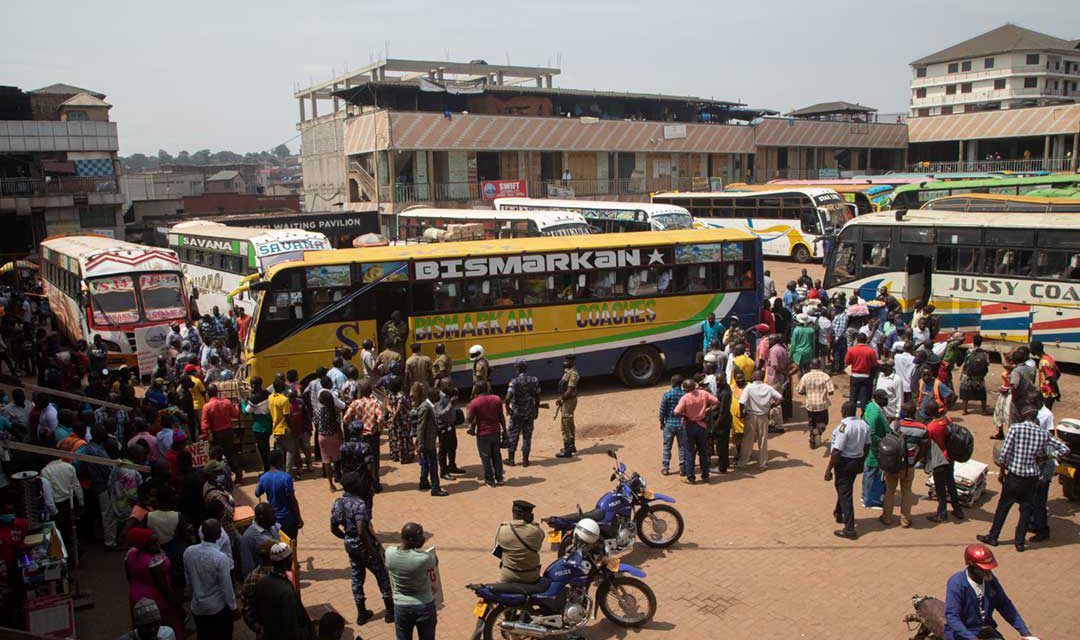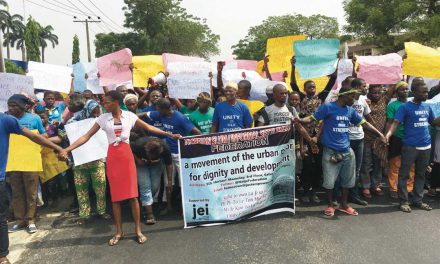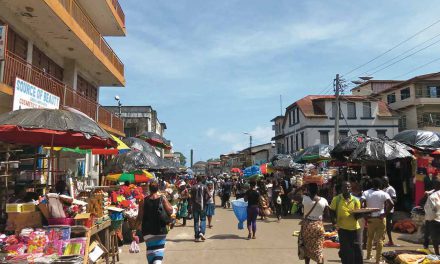
Taxi rank in Kampala, Uganda. Photo: Valentina Manente,
Strategic thinking and forward planning is required if Kampala is to avoid paying an unnecessarily hefty price for its rapid urban development
The Kampala Capital City Act, adopted in 2011, marked the start of a new phase for urban development in the Ugandan capital. The Act transferred primary responsibility for the management of the city from local-government structures to a newly established body – the Kampala Capital City Authority (KCCA).
The need for a change in approach was clear. The early 2000s had been increasingly characterised by a lack of service provision and planning, alongside widespread corruption at the local-council level. This attempt at a more technocratic solution for the city’s stagnated development has, however, been complicated by politics.
Kampala is a centre of political opposition in Uganda. Kizza Besigye, the opposition Forum for Democratic Change’s flag bearer in 2016, won over 60% of the vote in the capital, compared with 35% nationally, while the current mayor, Erias Lukwago, was elected with 80% of the vote in the same election. According to Liam Taylor, a journalist who has written on the city’s urban development, the creation of the KCCA was seen by many residents as “a power grab by Uganda’s authoritarian president, trampling on local democracy to stamp his will on the capital”.
The KCCA’s current executive director, Jennifer Musisi, was appointed directly by the president, sidelining the popular Lukwago to a largely ceremonial role in the management of the city. Despite this, his popularity among poor residents persists.
While Lukwago is politically sidelined, technically the case is less clear. “Opaque language in the 2010 KCCA Act creates opportunities for overlapping and contested roles and responsibilities in the institutional arrangement of Kampala,” researchers from the Uganda National Academy of Sciences concluded in a recent report, Owning our Urban Future. In 2017, the government sought to introduce a KCCA amendment Bill for debate in parliament aimed at bringing much-needed clarity.
But Lukwago, in particular, was critical; the proposed legislation would not only reduce his powers but strip him of his position as political head of the city. And he wasn’t only contesting the Bill. In 2016, President Yoweri Museveni appointed Betty Kamya, a former opposition colleague of Lukwago’s, as minister of state for Kampala – the minister to which the KCCA, of which Lukwago’s mayoral role is technically a part, reports. Their public feuding has added yet more complexity to the politics of governing Kampala.
Kampala contributes disproportionately to economic growth and job creation in Uganda. Its success, therefore, is vital not just for the two million or so residents who call it home but also for a further two-million commuters who make their way in from neighbouring districts in the greater Kampala area to work. This daily influx places huge pressure on already crumbling infrastructure; lengthy traffic jams at rush hour are an unrelenting feature of daily life in the capital. Moreover, many of these daily commuters contribute nothing financially towards the upkeep of infrastructure and the services they use because they live outside of the city’s catchment zone and so do not pay taxes there.
So far, the KCCA and local governments have failed to coordinate their approach in these periphery districts beyond some ad hoc, voluntary collaboration on waste management. An overall governance structure for co-ordination is needed for “efficient service delivery as well as to address the potential downsides and spillovers of urban sprawl such as inequality, traffic congestion, and environmental problems,” says Astrid Haas, a senior economist at the International Growth Centre, based in Uganda. She cites current road-infrastructure projects in the metropolitan area and the possibility of a mass public-transit system in the future as two examples where greater convergence will be necessary.
Strategic thinking and forward planning is required if Kampala is to avoid paying an unnecessarily hefty price for its rapid urban development. “Some estimates predict that retrofitted investments, after the city has already grown, can be up to three times more expensive,” says Haas. The KCCA’s Directorate of Revenue Collection has made impressive strides to grow the city’s income, albeit from a very low base, doubling revenues between 2012 and 2015. This achievement was due mainly to streamlining and digitising the tax-paying process. However, much of this internally generated revenue has been spent on furthering KCCA institutional capacity. Insufficient improvement in public services is evident.
And poorer residents feel targeted. A popular criticism of KCCA is that it relies heavily on enforcement rather than on building a social contract with citizens. In a song, released in 2012 by Bobi Wine – a musician, MP, and self-styled “Ghetto President” – he accused Jennifer Musisi of not listening to the concerns of ordinary residents. Politics is again at play. What makes financial sense does not always make political sense.
One of the biggest obstacles facing the city’s revenue-generation strategy comes not from disgruntled citizens but from a promise made by President Museveni. In 2006, on the campaign trail, he declared that owners of occupied residences in the city would be exempted from property taxes. With an estimated 54% of properties falling into this category, Museveni’s announcement closed off one possibility for quick gains for the city.
Other political promises during election campaigns, particularly from the incumbent president, have added a further layer of complexity to city management. In early 2016, KCCA efforts to better regulate minibuses (matatu) with the introduction of designated stops for passengers – which transport operators opposed – coincided with an election campaign. Museveni, keen to win votes in a city where he has consistently struggled to do so, ensured that the measure was put on hold.
The transport sector provides an illustration of the ways in which urban development and city politics compete, rather than complement each other. In 2015, the KCCA took over the running of the transport sector from the Uganda Taxi Operators and Drivers Association (UTODA), and oversaw a significant improvement in revenue collection – despite pushback from drivers against the new levies.
The KCCA had removed one political obstacle. UTODA had previously demonstrated its power, for instance, when it led a transport strike that brought Kampala to a halt. But after UTODA was sidelined, another hurdle loomed. Since 2013, the KCCA has been trying to phase out matatus, and replace them with more efficient buses. But many politicians are thought to have vested interests in the sector, and further plans for reforms will not be straightforward.
The World Bank estimates that Kampala’s population could reach 10 million by 2050. The city already contributes an estimated 31.2% of Uganda’s national GDP, according to a 2017 presentation by Somik Lall, a leading urban economist at the World Bank. Ensuring that Kampala’s urban development keeps pace with its growing population is vital, but so too is finding an approach that is inclusive of the needs and voices of the city’s poorer residents, who are integral to its function.
Excluding such perspectives from the implementation of the National Urban Policy, which was proposed in 2013, could create further problems. “Political ideals for local governance and popular participation in Kampala have largely been superceded by claims of improved urban management and service delivery through central government oversight,” says Nansozi Muwanga, a lecturer in political science at the city’s Makerere University.
There is a danger that this top-down approach will create a vision for the city that sees poorer residents who exist in informal spaces as a hindrance to development rather than integral to it. While politics will continue to get in the way of the effective management of Kampala, greater transparency and willingness to engage with residents on behalf of city authorities can limit its impact and create a more inclusive space for citizen involvement in urban development.
Jamie Hitchen is a researcher at the Africa Research Institute in London. He holds an MA in history from University of Edinburgh and an MSc in African politics from the School of Oriental and African Studies (SOAS). He is interested in how informal structures leverage political power and has worked on these themes in Uganda, Ghana and Sierra Leone. He has written for the Daily Maverick, World Politics Review and Africa is a Country.













